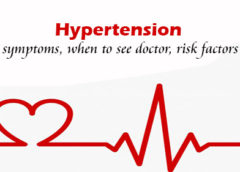What is hypertension?
Hypertension is also termed as High blood pressure, it is a common condition in which blood applies too much force against your artery walls is high enough that it may cause health issues, and such as heart disease. it is the medical term for high blood pressure.
Blood pressure is determined both by the amount of blood your heart pumps and the amount of resistance to blood flow in your arteries. The more blood your heart pumps and the narrower your artery walls, the higher your blood pressure.
It is when the pressure of the blood being pumped through your arteries is higher than it should be.
The person with hypertension may not notice any signs or symptoms and it is often called the “silent killer”.
You can have high blood pressure for years without any symptoms. Even without symptoms, damage to blood tubes and your heart continues and can be detected. Uncontrolled hypertension will excess your risk of serious health issues, including heart attack.
Hypertension generally develops over many years, and it affects nearly everyone eventually. Fortunately, hypertension can be easily detected. And once you know you have high blood pressure, you can work with your doctor to control it.
Read Also: Safety Tips to avoid Coronavirus
Symptoms
Most people who have hypertension have no symptoms, even if their readings reach dangerously high levels.
A few people with hypertension may have headaches, shortness of breath, sleeping problems, weakness in the body, anxiety, nosebleeds, etc. but these symptoms are not specific and usually do not occur until hypertension has reached a life-threatening stage.
When to see a doctor
You’ll likely have your blood pressure taken as part of a routine doctor’s appointment.
Ask your doctor for a blood pressure reading at least every one and half years starting at age 17. If you are the age 35 or older, or you are 17 to 34 with a high risk of hypertension, ask your doctor for hypertension reading every year.
Hypertension generally should be checked in both arms to check if there is a difference. It is necessary to use an appropriate-sized arm cuff.
Your doctor will likely recommend more frequent readings if you have already been diagnosed with hypertension or have other risk factors for cardiovascular disease. Children aged 2.5 and older will usually have blood pressure measured during their yearly checkups.
If you do not regularly see your doctor, you may be able to get a free blood pressure screening at a health resource fair or other locations in your community. You can also find machines in some stores that will measure your blood pressure for free.
Public blood pressure machines, such as those found in pharmacies, may provide helpful information about your blood pressure, but they may have some limitations. The accuracy of these machines depends on several factors, such as the correct cuff size and proper use of the machines. Ask your doctor for advice on using public blood pressure machines.
What are the risk factors for hypertension?
Although for most people there is no identifiable cause of hypertension, there are known risk factors that increase the likelihood that you will become hypertensive. Several of these are things that you can’t do anything about, including:
- Genetics: having family members with hypertension increases the likelihood that you will too.
- Race: hypertension is more common in people with dark skin as compared to people with pale skin
- Age: As you grow your blood tubes become more rigid, preventing blood tubes from opening as effectively as when you were younger, which excesses peripheral resistance.it is more common in people over 55 years.
- Size and weight: overweight or oversize is also a risk factor for hypertension.
- Inactivity: those people who are not active have a 25%-55% increased risk.
- Poor diet: Eating extra salt in food, consuming much alcohol, and eating poor habits can also excess your risk of hypertension.
- Stress: Bodies respond to stress by raising blood pressure, and ongoing stress will keep your BP high.
- Smoking: whenever you smoke a cigarette, it causes an immediate increase in blood pressure.

Leave a Reply
You must be logged in to post a comment.